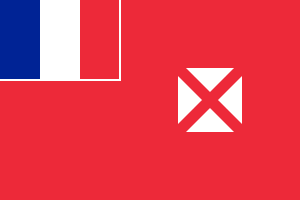Demographics of Wallis and Futuna
This article is about the demographic features of the population of Wallis and Futuna, including population density, ethnicity, education level, health of the populace, economic status, religious affiliations and other aspects of the population.
CIA World Factbook demographic statistics
The following demographic statistics are from the CIA World Factbook, unless otherwise indicated.[1]
Population
- 15,854
Age structure
- 0–14 years: 20.58% (male 1,702/female 1,561)
- 15–24 years: 14.72% (male 1,238/female 1,095)
- 25–54 years: 43.55% (male 3,529/female 3,376)
- 55–64 years: 9.92% (male 742/female 830)
- 65 years and over: 11.23% (male 856/female 925)
Population growth rate
- 0.28%
Birth rate
- 12.7 births/1,000 population
Death rate
- 5.7 deaths/1,000 population
Net migration rate
- -4.3 migrant(s)/1,000 population
Infant mortality rate
- Total: 4.2 deaths/1,000 live births
- Male: 4.4 deaths/1,000 live births
- Female: 3.9 deaths/1,000 live births
Life expectancy at birth
- Total population: 80.2 years
- Male: 77.2 years
- Female: 83.4 years (2020 est.)
Total fertility rate
- 1.71 children born/woman
Nationality
- noun: Wallisian(s), Futunan(s), or Wallis and Futuna Islanders
- adjective: Wallisian, Futunan, or Wallis and Futuna Islander
Ethnic groups
Religions
- Roman Catholic 99%
- Other 1%
Languages
- Wallisian (indigenous Polynesian language): 58.9%
- Futunian: 30.1%
- French (officials): 10.8%.
- Other: 0.2%
See also
References
- "Australia-Oceania :: WALLIS AND FUTUNA". CIA The World Factbook.
This article is issued from Wikipedia. The text is licensed under Creative Commons - Attribution - Sharealike. Additional terms may apply for the media files.
